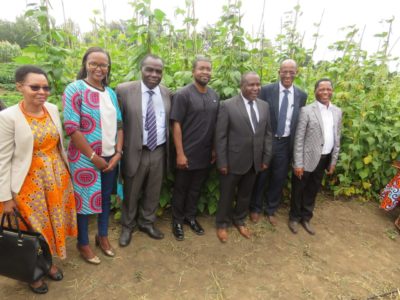Tanzania has officially released two high-iron and zinc bean varieties. The Minister for Agriculture Dr. Charles Tizeba, on 20th June, unveiled these two together with seven other improved bean varieties in Arusha. This is a major milestone under the International Potato Center (CIP) led project Building Nutritious Food Baskets (BNFB) funded by Bill & Melinda Gates Foundation (BMGF).


(Left) Various participants inspect released bean varieties . (Right)The BNFB team and partners during the release.
The BNFB project promotes a “ food basket” of four biofortified crops: (high iron and zinc beans (Tanzania only), pro-vitamin A (PVA) (orange) maize, orange-fleshed sweetpotatoes (OFSP) and yellow cassava (Nigeria only).
“Since project inception, we have been advocating for and promoting OFSP, PVA maize, and cassava – all useful in addressing vitamin A deficiency. The release of Selian 14 and Selian 15 high iron and zinc bean varieties completes our “nutritious food basket” and will enable us to contain the high levels of anemia in Tanzania,” says Dr. Hilda Munyua, BNFB Project Manager based at CIP.
Selian 14 and 15 are a special type of conventionally bred biofortified beans that contain high levels of iron and zinc. Biofortification enhances the nutritional value of staple food crops such as, sweetpotatoes, beans, cassava and maize, by increasing the density of vitamins and minerals in a crop through either conventional plant breeding, agronomic practices or biotechnology.

The research and release efforts were led by Selian Agricultural Research Institute (SARI) in partnership with the Agricultural Research Institute (ARI) Uyole, ARI Maruku and the International Center for Tropical Agriculture (CIAT)—part of a mix of partners in BNFB.
With this release, Tanzania joins other countries in the region that have released high-iron bean varieties such as Rwanda, Burundi, DR Congo and Uganda. The drive to release the high-iron beans was informed by the high prevalence of anemia globally and Tanzania, especially among the children under five, adolescent girls, and expectant mothers.
BNFB has an overall goal of reducing hidden hunger and purposes to demonstrate how scaling up of “multiple biofortified crops” can be achieved. The goal is that 2,175 million additional households will adopt biofortified crops in Nigeria and Tanzania because of the BNFB investment over the next five years.
“We are now all set to scale-up a “nutritious food basket” as one of the key interventions of reducing hidden hunger in Nigeria and Tanzania,” concludes Dr. Munyua.
Here is the media coverage from the launch of the high iron and zinc beans in Tanzania:
- New iron rich beans to contain anemia – The Citizen
- Minister wants new bean varieties distributed to farmers – IPP Media
- Minister to launch new bean seed varieties – The Citizen
- (Swahili) Dkt Tizeba azindua aina mpya 9 za mbegu bora za maharage – Blog and Zanzi News
- (Swahili) Dk Tizeba ataka uzalishaji Zaidi mbegu za maharage – Mwananchi
Further reading:
Brochure: Fighting Iron Deficiency: New Improved High-iron and Zinc Beans Released in Tanzania
Blog written by Vivian Atakos – Regional Communications Specialist (CIP-SSA)
